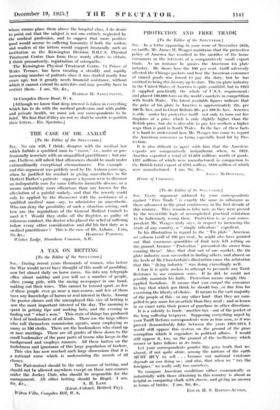A TAX ON BETTING • {To the Editor of the
SPECTATOR.] Sig,— During recent years thousands of women, who before the War would never have thotight of this mode of gambling, now bet almost daily on horse races. Go into any telegraph ()Mee about midday and you will see a number of people, often young girls, with the racing newspaper in one hand, making out their wires. This cannot be termed sport, as few of these people ever go near a race-course, and few of them have any knowledge of horses or real interest in them. Among the poorer classes and the unemployed this vice of betting is now the most important interest of the day. The morning is spent in getting tips and making bets, and the evening in finding out " what's won." This state of things has produced a host of bookmakers of all kinds. There arc the large offices who call. themselves commission agents, some employing as many as 100 clerks. There are the bookmakers who stand up at race meetings. There are all grades of these down to the small bookmaker of the poor parts of towns who keeps in the background and employs runners. All these batten on the foolishness and ignorance of this large population of backers.
This vice has now reached such large dimensions that it is a national curse which is undermining the morale of all • classes., The Pari-mutuel should be the only means of betting, and should not be allowed anywhere except on those race-courses under the .Jockey Club, who should be responsible for the management. All other betting should be illegal.—I am, , (Lieut.-Colonel, Retired. Pay). Tilton Villa, Canipden Hill, W. 8.














































 Previous page
Previous page